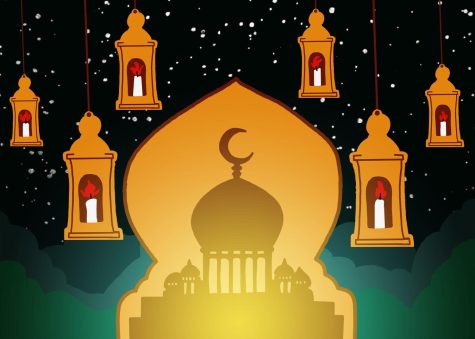Columbia’s Muslim students celebrate Ramadan, a month of fasting, charity and spiritual strengthening
April 4, 2022

Celebrated by Muslims around the world, Ramadan officially started at sunrise on April 2 this year, and students from Columbia’s Muslim community talked to the Chronicle about their family traditions and what the holy month means to them.
Ramadan, observed annually for one month based on the lunar calendar, starts 11 days earlier every year and marks the month the Prophet Muhammad received the initial revelations of the Quran, the holy book for Muslims.
To Muslims, Ramadan teaches self-discipline, self-control, sacrifice and empathy for those who are less fortunate, encouraging actions of generosity and compulsory charity. Along with this, fasting helps instill compassion for the food-insecure. All the reasonings for fasting stem from one main purpose: strengthening one’s connection with God and Islam.
Summer Radwan, secretary of Columbia’s Muslim Student Association and a junior communication major, describes Ramadan as a month allowing Muslims to reflect on their own spirituality, as well as a time to connect with fellow Muslims in the community.
“We all gather at a local mosque and pray Taraweeh, which is where we pray extra prayers rather than the ones that are obligatory,” Radwan said. “That’s a time for us to connect with God together.”
Radwan said connecting with the community through Ramadan makes the period of fasting easier because everyone does it together, so there is mutual support from everyone in the community.
Radwan prepares for Ramadan by trying to keep consistent with her daily prayers, as well as fasting a couple of days before to get used to it. During Ramadan, her family eats iftar together every night, which is a meal that marks the daily break from fasting. Radwan’s family also prays the last prayer of the day together, making these moments with her family more special.
Kashf Fatima, vice president of MSA and a junior marketing major who was born and raised Muslim, is now practicing Islam with the intent of extending her knowledge and making an effort to find her spirituality.
“Ramadan is a month where you dedicate yourself to God,” Fatima said. “If you wanted to have a moment to find yourself spiritually, Ramadan is a perfect time to do it.”
Fatima said many factors of Ramadan are beneficial, like reading from the Quran, praying all five daily prayers, strengthening and understanding your relationship with God and acknowledging those who may be less fortunate than you.
During Ramadan, there will be events the MSA puts together that students can look forward to, like iftar dinners, henna booths before Eid and an Eid picnic with MSAs from other Chicago colleges and universities.
Sumana Syed, a sophomore film and television major, is a Shia Muslim who was raised with a strong connection to Islam. Syed said Ramadan is a month of fasting that represents Muslims being thankful to God, and this time is used to do good deeds, read the Quran and learn more about Islam in general.
Although only three people in her family fast, with the others not fasting due to medical reasons or age, Syed’s family comes together for Ramadan to have iftar. Family traditions in Syed’s family consist of helping her family and community prepare for iftar, whether that be at their houses or the masjid, or mosque.
Syed said Ramadan gives her time to focus on religion and get closer to God because sometimes she feels like she does not prioritize religion as much. Ramadan gives her time to go to the masjid, as well as attend the lectures and series that aid her in learning more about Islam.
Beyond her own reasons for fasting, Syed believes there is something everyone can get out of fasting, even if they are not Muslim.
“I’d welcome anyone who’s not Muslim to try fasting for a day. We do it because we want to thank God, but it is a good thing for you health-wise,” Syed said. “I would welcome anyone to try fasting for a couple of days and see how that benefits them.”







